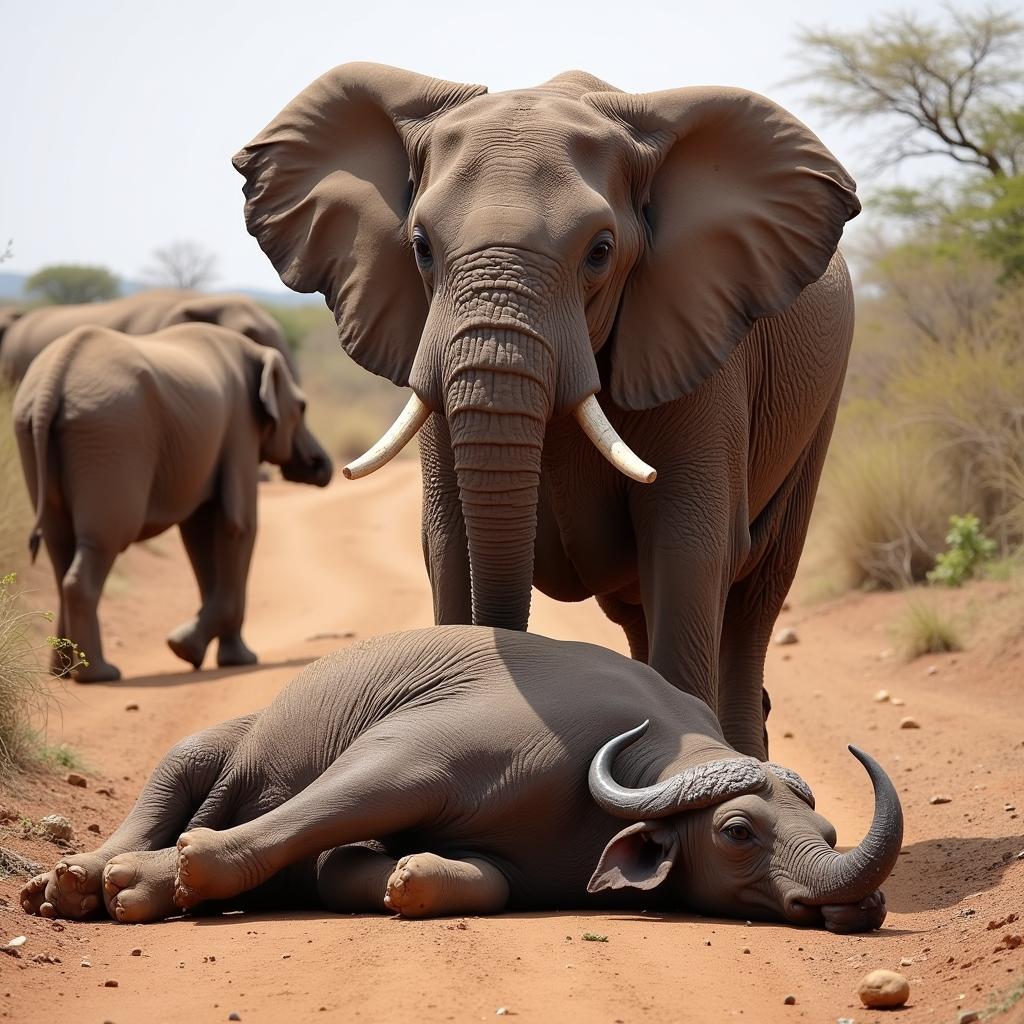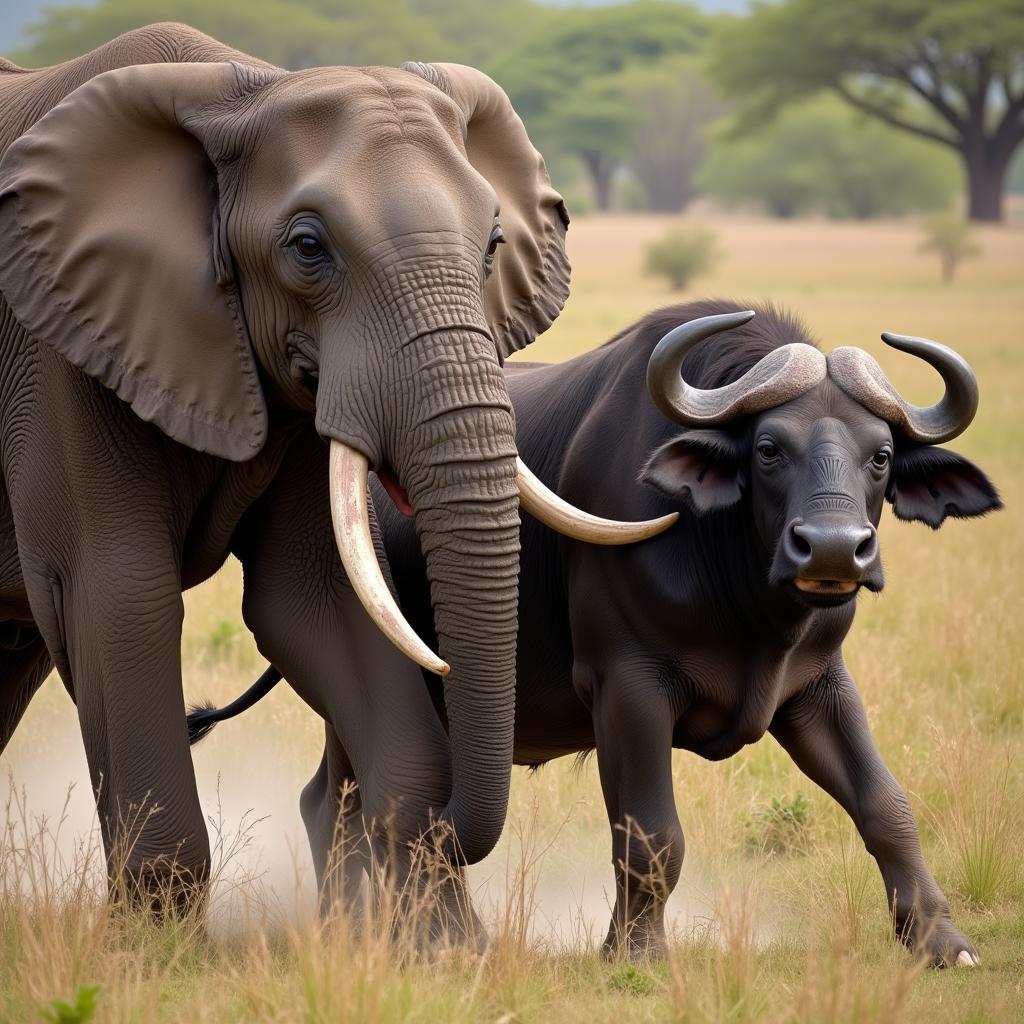African Elephant Kills Buffalo: A Raw Display of Power
An African elephant killing a buffalo is a dramatic event showcasing the raw power of these magnificent creatures. While often perceived as gentle giants, elephants can be formidable and even deadly, especially when provoked or protecting their young. This article delves into the reasons behind these confrontations and their impact on the African ecosystem.
Do elephants kill buffalo often? What are the reasons behind such aggression? This article explores these questions and more. You can also find valuable insights about similar topics on our website. Check out our resources on African animal tracks for more information.
Understanding Elephant Behavior and Buffalo Interactions
African elephants, despite their immense size, are primarily herbivores. They are not natural predators of buffalo. However, several factors can lead to aggressive encounters, sometimes culminating in a buffalo’s death. These encounters aren’t predatory in nature; rather, they are often driven by defensive or territorial instincts.
Competition for Resources
Both elephants and buffalo rely on similar resources, including water and grazing areas. During periods of drought or resource scarcity, competition can heighten tensions between the two species, leading to confrontations. Elephants, being larger and stronger, have a distinct advantage in these situations.
Protecting Young
Mother elephants are fiercely protective of their calves. They will readily defend them against any perceived threat, including a buffalo that wanders too close. These protective instincts are incredibly powerful and can result in aggressive displays of dominance, sometimes fatal for the buffalo.
Territorial Disputes
Elephants are known to establish and defend territories, especially around critical resources like waterholes. Buffalo herds can inadvertently encroach on these territories, triggering aggressive responses from the elephants. These territorial disputes can escalate quickly, resulting in physical confrontations.
 African Elephant Kills Buffalo in Territorial Dispute
African Elephant Kills Buffalo in Territorial Dispute
Accidental Encounters
Sometimes, encounters between elephants and buffalo are purely accidental, stemming from surprise or close proximity. In such instances, an elephant’s initial reaction might be defensive, potentially leading to an escalation of aggression if the buffalo doesn’t retreat quickly enough.
The Dynamics of an Elephant Attack
An elephant attack on a buffalo is a brutal display of force. The elephant might charge, using its tusks to gore or toss the buffalo. It could also trample the buffalo under its massive weight, inflicting crushing injuries. The outcome for the buffalo is often grim.
 African Elephant Attacking Buffalo with Tusks
African Elephant Attacking Buffalo with Tusks
The Ecological Impact
While the sight of an african elephant calf near a dead buffalo may be disturbing, these incidents play a role in the complex ecosystem. The carcass provides a food source for scavengers, contributing to the cycle of life and death in the African savanna.
These incidents also underscore the importance of conservation efforts. Protecting both elephants and buffalo, and ensuring they have adequate habitat and resources, is crucial for maintaining the delicate balance of the African ecosystem. For those interested in African hunts and adventures, it’s essential to remember the importance of responsible tourism and conservation.
Conclusion
An African elephant killing a buffalo is a stark reminder of the power and complexity of nature. While tragic for the buffalo, these incidents are often a result of natural behaviors like territorial defense and protection of young. Understanding these behaviors is crucial for appreciating the dynamics of the African ecosystem and supporting effective conservation strategies. The survival of both species depends on our continued efforts to protect their habitat and ensure their future. This knowledge deepens our understanding of the Big 5 African animals.
FAQs
-
Do elephants actively hunt buffalo? No, elephants are herbivores and do not hunt buffalo for food.
-
Why do elephants attack buffalo? Elephants usually attack buffalo in self-defense, to protect their young, or in territorial disputes.
-
Are elephant attacks on buffalo common? While not an everyday occurrence, such attacks can happen, particularly during times of resource scarcity.
-
What happens to the buffalo carcass? The carcass becomes a food source for scavengers, playing a vital role in the ecosystem.
-
How can I learn more about 10 African animals? Visit our linked resource to discover more fascinating facts.
You might also be interested in learning more about other interactions between African animals.
For any assistance, please contact us at Phone: +255768904061, Email: [email protected], or visit our office at Mbarali DC Mawindi, Kangaga, Tanzania. Our customer support team is available 24/7.
